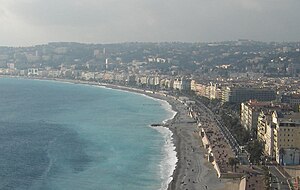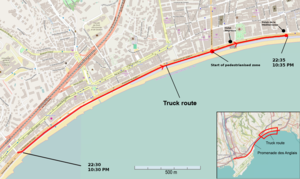2016 Nice attack
| 2016 Nice attack | |
|---|---|
| Part of Islamic terrorism in Europe and the France-ISIL conflict | |

The Promenade des Anglais, the site of the attack
|
|

Route of the attacker from west to east
|
|
| Location | Promenade des Anglais, Nice, France |
| Coordinates | 43°41′37″N 7°15′21″E / 43.6936°N 7.2557°ECoordinates: 43°41′37″N 7°15′21″E / 43.6936°N 7.2557°E |
| Date | 14 July 2016 (Bastille Day) c. 22:30 - 22:35 CEST (UTC+02:00) |
|
Attack type
|
Vehicle-ramming attack, shooting, massacre |
| Weapons | Cargo truck, 7.65mm pistol |
| Deaths | 87 (including the perpetrator) |
|
Non-fatal injuries
|
434 |
| Assailant | Mohamed Lahouaiej-Bouhlel |
|
Suspected perpetrators
|
Six suspects arrested for complicity |
On the evening of 14 July 2016, a 19 tonne cargo truck was deliberately driven into crowds celebrating Bastille Day on the Promenade des Anglais in Nice, France, resulting in the deaths of 86 people and injuring 434. The driver was Mohamed Lahouaiej-Bouhlel, a Tunisian resident of France. The attack ended following an exchange of gunfire, during which Lahouaiej-Bouhlel was shot and killed by police.
The Islamic State of Iraq and the Levant (ISIL) claimed responsibility for the attack, saying Lahouaiej-Bouhlel answered its "calls to target citizens of coalition nations that fight the Islamic State". On 15 July, François Molins, the prosecutor for the Public Ministry, which is overseeing the investigation, said the attack bore the hallmarks of jihadist terrorism.
On 15 July, French President François Hollande called the attack an act of Islamic terrorism, announced an extension of the state of emergency (which had been declared following the November 2015 Paris attacks) for a further three months, and announced an intensification of French airstrikes on ISIL in Syria and Iraq. France later extended the state of emergency until 26 January 2017. The French government declared three days of national mourning starting on 16 July. Thousands of extra police and soldiers were deployed while the government called on citizens to join the reserve forces.
On 21 July, prosecutor François Molins said that Lahouaiej-Bouhlel planned the attack for months and had help from accomplices. By 1 August, six suspects had been taken into custody on charges of "criminal terrorist conspiracy", three of whom were also charged for complicity in murder in relation to a terrorist enterprise. On 16 December three further suspects, allegedly involved in the supply of illegal weapons to Lahouaiej-Bouhlel, were charged.
...
Wikipedia
